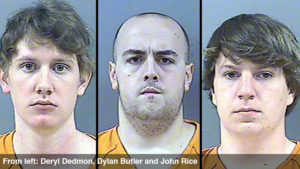
from left: Dedmon, Butler, Rice
The three white men who were sentenced earlier this week in Mississippi for the unconscionably brutal 2011 lynching of James Craig Anderson during a “nigger hunt” made national headlines because of their horrific crime—so federal judge Carlton Reeves used the occasion of their sentencing to make a public spectacle of the three men.
Reeves, Mississippi’s second African-American federal judge in history, who was appointed by President Obama in 2010, sentenced Deryl Paul Dedmon to 50 years and five years to be served concurrently; John Aaron Rice to 18 ½ years and five years to be served concurrently; and Dylan Wade Butler to seven years and five years to be served concurrently—with none of them eligible for parole.
But as he sat in front of the three men in a Jackson courtroom, Reeves set aside usual judicial protocol and gave a remarkable, lengthy speech about Mississippi’s ugly history of lynchings and racial terrorism and how the three of them had torn the scab off old wounds that were finally starting to heal in the “new Mississippi.”
“Those crimes of the past as well as these have so damaged the psyche and reputation of this great State,” he said.
“Mississippi soil has been stained with the blood of folk whose names have become synonymous with the Civil Rights Movement like Emmett Till, Willie McGee, James Cheney, Andrew Goodman, Michael Schwerner, Vernon Dahmer, George W. Lee, Medgar Evers and Mack Charles Parker,” Reeves said. “But the blood of the lesser-known people like Luther Holbert and his wife, Elmo Curl, Lloyd Clay, John Hartfield, Nelse Patton, Lamar Smith, Clinton Melton, Ben Chester White, Wharlest Jackson and countless others, saturates these 48,434 square miles of Mississippi soil. On June 26, 2011, four days short of his 49th birthday, the blood of James Anderson was added to Mississippi’s soil.
“The common denominator of the deaths of these individuals was not their race. It was not that they all were engaged in freedom fighting. It was not that they had been engaged in criminal activity, trumped up or otherwise. No, the common denominator was that the last thing that each of these individuals saw was the inhumanity of racism. The last thing that each felt was the audacity and agony of hate; senseless hate: crippling, maiming them and finally taking away their lives.”
Reeves said his state has “struggled mightily” to reinvent itself as new generations have attempted to “pull Mississippi from the abyss of moral depravity in which it once so proudly floundered in. ”
But he said Dedmon, Butler and Rice, in addition to the other members of their mob whose fates haven’t yet been sealed, “ripped off the scab of the healing scars of Mississippi, causing her, our Mississippi, to bleed again.”
The judge mentioned the report released on Tuesday by the Alabama-based Equal Justice Initiative that revealed there were 3,959 Black people lynched in the United States between 1877 and 1950—a number that is 700 more than previously known—and Georgia, Mississippi and Louisiana had more lynchings than any other state in the country. The revelations in the report attempt to place this horrid form of American racial terrorism in its proper historical context as a tool of white supremacy that had a profound impact on the nation.
Anderson, who sang tenor in the choir at the First Hyde Park Missionary Baptist Church in Jackson and who was helping his partner of 17 years raise a 4-year-old child, was set upon in a parking lot shortly before dawn by a group of white teenagers who drove into Jackson—which they called “Jafrica” because of its large Black population—looking to “f**k with some n*ggers.” They beat Anderson, then drove their pickup truck over him, killing him while some of the teens reportedly yelled out the words “white power.”
Anderson’s partner, James Bradfield, said the couple’s young son sleeps in the bed with him now because “he doesn’t want those people to get me.”
“There’s no room on earth for people like you,” Bradfield said in a statement he had the prosecutor read.
The three men all pleaded guilty in March 2012 to one count of conspiracy and one count of committing a hate crime.
During her statement, Anderson’s sister, Barbara Anderson Young, looked straight at the defendants and said, “Surely the violence you committed will fall upon your own head,” adding that her brother “lives on in me, and in our family. He also lives in you, the last to see him alive on this earth.”
James Craig Anderson’s partner, James Bradfield, said the couple’s young son sleeps in his bed now, because “he doesn’t want those people to get me.”
In the victim impact statement, Bradfield, who was too emotional to speak and had a prosecutor read his statement, told Deryl Paul Dedmon, John Aaron Rice, and Dylan Wade Butler that he hoped they never see the light of day again.
“There’s no room on earth for people like you,” he said.
The trio were sentenced to federal prison on Tuesday as a result of Anderson’s 2011 death, a hate crime in which he was beaten and run over by a truck because of the color of his skin.
Ironically Dylan Butler for the last 15 years has been raised by an African-American stepfather and lived with an African-American stepsister, plus his mother and two sisters. The family, according to the stepfather, understandably is “saddened and heart broken.”
